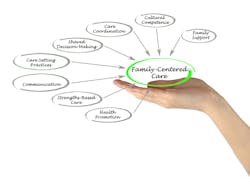The National Quality Forum (NQF) has issued a report offering five recommendations for using EHRs to effectively facilitate, measure, and improve care communication and care coordination across multiple healthcare settings.
Patients commonly interact with numerous providers in multiple healthcare systems and settings, resulting in medical information spread across various, often disconnected, sources. Efficiently communicating this information between patients, caregivers, clinicians, case managers, and other stakeholders would enable care teams to better coordinate different aspects of care and ensure they are aligned with patient goals, the NQF said.
With funding from the Centers for Medicare & Medicaid Services (CMS), NQF convened a multistakeholder committee to identify opportunities to measure and improve care communication and care coordination using EHRs. NQF’s new report, “Leveraging Electronic Health Record (EHR)-Sourced Measures to Improve Care Communication and Coordination,” outlines the following five recommendations to make EHRs more useful in measuring and identifying areas for improvement:
• Collect and share standardized data
• Optimize EHR usability for patients and caregivers
• Optimize EHR usability for clinicians
• Develop novel EHR data elements to improve measurement
• Leverage EHR data to fill measurement gaps
To leverage the benefits of EHR-sourced data for measurement, the report said, the U.S. health system must continue to advance the availability of standardized data elements. Initiatives such as USCDI lay the groundwork for this standardization, and the committee identified additional standardized data elements that could be added to EHRs to facilitate the measurement of care communication and care coordination. The committee identified gaps in standardized data elements related to the following:
• Care communication and care coordination actions (e.g., shared decision making, tools to facilitate care planning).
• Goals of care that can be entered by clinicians and other team members, as well as the ability to identify tailored patient goals (e.g., to be able to attend a daughter’s wedding) and fields for clinicians to assess whether these goals are met.
• Reasons for transitions in care across settings (e.g., due to problems in care coordination, a diagnostic error, or a clinician or team member who is signing off of a case).
• Communication between clinicians and patients and their caregivers (e.g., during a transition in care, when critical test findings are communicated).
In addition, the report said, EHRs can improve measure feasibility by replacing chart review and claims-based data with automated extraction; provide data elements (both existing and novel) to develop new measure concepts related to care communication and care coordination; improve the specificity of existing accountability measures by re-specification with an EHR data source; and export data to measure specific processes and outcomes important to care communication and care coordination.
The recommendations also are intended to promote greater accountability, NQF said. Better use of EHR-sourced data is critical to measure and improve the quality of care in general, and also essential to promoting equitable health outcomes. Gaps in care communication and care coordination are more likely to negatively impact patients disproportionately affected by social determinants of health (SDOH) factors, such as food or housing insecurity, increasing their risk of worse outcomes.
“Fragmentation in healthcare is one of the most commonly cited frustrations among patients, and yet measuring and improving coordination and communication across care settings has remained largely intractable,” said Dana Gelb Safran, ScD, president & CEO of NQF, in a statement. “EHRs hold enormous promise for solving both the technical challenges of communication and coordination across settings, and the measurement challenges related to these critical dimensions of quality.”
Since different health systems may be at different stages of achieving full interoperability and have different levels of technical functionality, the report outlines recommended actions that can be taken by organizations at different EHR maturity levels.


